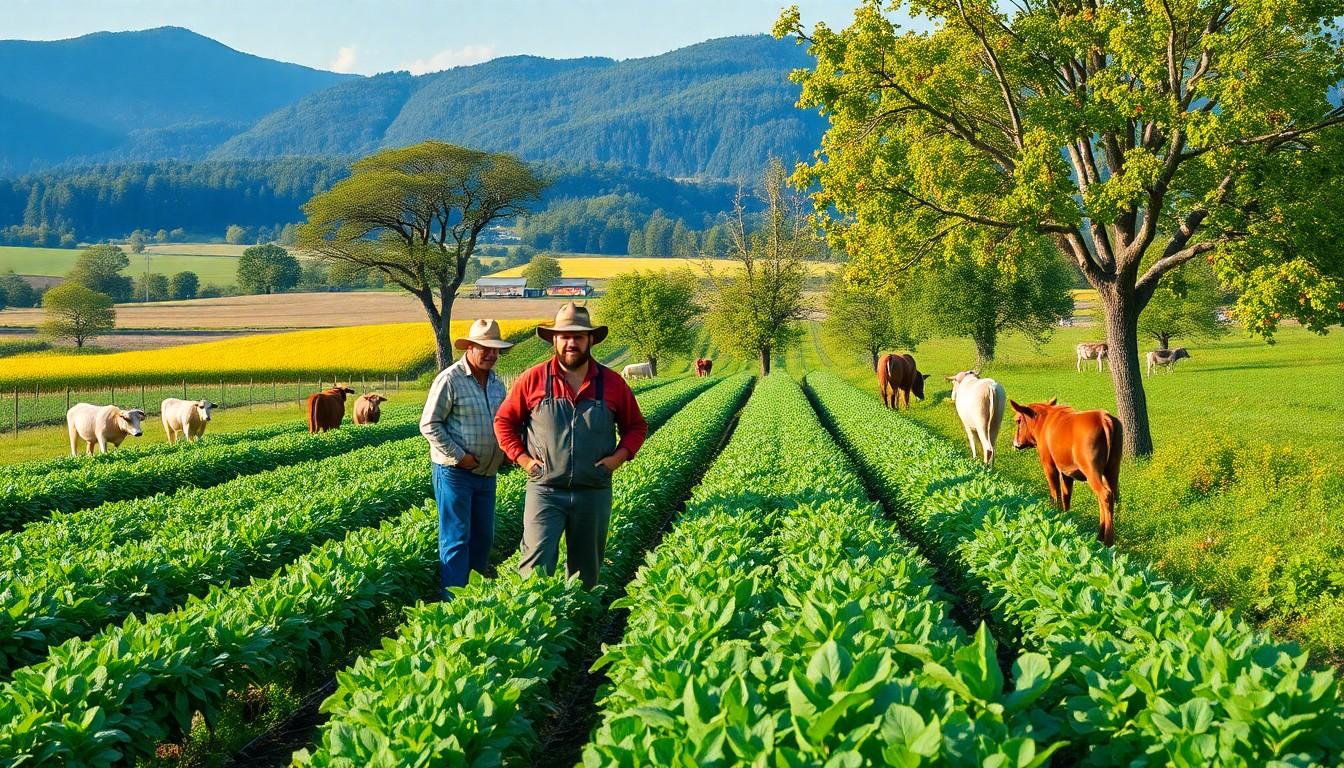In a world where avocado toast reigns supreme and kale has become a household name, sustainable farming methods are the unsung heroes of our food system. Picture this: farmers working in harmony with nature, growing delicious produce while keeping the planet happy. It’s not just a pipe dream; it’s a necessity! As climate change looms and resources dwindle, embracing sustainable practices is like giving Mother Earth a much-needed hug.
Sustainable Farming Methods
Sustainable farming methods encompass practices that aim to produce food while minimizing environmental impact. These techniques uphold agricultural productivity, enhance biodiversity, and promote soil health.
Definition and Importance
Sustainable farming emphasizes environmentally friendly practices that maintain farm viability. This approach prioritizes long-term ecological balance over short-term gains, addressing issues like soil depletion, water scarcity, and climate change. Sustainable methods are crucial for providing nutritious food while safeguarding natural resources for future generations. Implementing these practices leads to healthier ecosystems that support various plant and animal species. These methods also improve resilience against climate fluctuations, ensuring food security.
Key Principles
Key principles of sustainable farming focus on environmental conservation and resource efficiency. Crop rotation enhances soil fertility and disrupts pest cycles. Integrated pest management reduces reliance on chemical pesticides, promoting biodiversity. Utilizing cover crops prevents soil erosion and improves nutrient retention. Sustainable water management techniques, such as rainwater harvesting, help conserve water resources. These principles combine to create a farming system that produces food responsibly while preserving natural ecosystems. Each practice contributes to a holistic approach that balances productivity with ecological stewardship.
Types of Sustainable Farming Methods

Sustainable farming encompasses various methods that prioritize ecological balance and resource conservation. Here are key sustainable farming practices.
Organic Farming
Organic farming emphasizes natural processes and materials. This method prohibits synthetic fertilizers and pesticides, focusing on crop health and biodiversity instead. Farmers enhance soil fertility through composting and crop rotation, which promote sustainable ecosystems. Biodiversity thrives under organic practices, as they aim to create habitats that support beneficial insects and microorganisms. Research indicates organic farming can yield comparable outputs to conventional methods while improving environmental health.
Permaculture
Permaculture focuses on designing agricultural systems that mimic natural ecosystems. It integrates land, resources, and communities effectively to create self-sufficient environments. This approach emphasizes diversity, sustainability, and regeneration through careful planning and management. Techniques such as companion planting and water catchment optimize resource use. Environmental resilience increases with permaculture, allowing systems to adapt to changing conditions while producing food sustainably.
Agroforestry
Agroforestry combines agriculture with forestry practices, fostering biodiversity and enhancing land productivity. This method encourages planting trees alongside crops or livestock. Benefits include improved soil health, increased shade for crops, and a habitat for wildlife. Research shows agroforestry can increase yields while sequestering carbon, thus mitigating climate change impacts. Overall, this method enhances ecosystem services while providing economic opportunities for farmers.
Benefits of Sustainable Farming Methods
Sustainable farming methods offer various advantages for the environment, economy, and society. These benefits enhance the agricultural landscape and contribute to global food security.
Environmental Impact
Sustainable farming significantly enhances soil health and agricultural biodiversity. Practices like crop rotation and cover cropping prevent soil depletion and erosion. They also promote natural pest control through integrated pest management. Reduced reliance on synthetic fertilizers and pesticides supports cleaner waterways and protects beneficial wildlife. Additionally, these methods contribute to carbon sequestration, helping mitigate climate change effects. Overall, sustainable farming promotes ecological balance and resilience against environmental challenges.
Economic Advantages
Economic advantages accompany sustainable farming practices. By reducing input costs such as fertilizers and pesticides, farmers experience lower operational expenses. Additionally, diverse crops can lead to better market opportunities and increased revenue streams. Sustainable methods often lead to higher quality produce, which can command premium prices. Furthermore, practices like agroforestry enhance land productivity while providing alternative income sources. The economic resilience fostered by these practices strengthens local communities and supports long-term agricultural viability.
Social Benefits
Social benefits arise from implementing sustainable farming methods. These practices often strengthen community ties through local food networks and cooperative initiatives. Improved food security results as sustainable farms produce healthier, nutrient-dense foods. Farmers practicing sustainability experience increased job satisfaction due to a stronger connection to their land and community. Moreover, educating consumers about sustainable practices fosters awareness and encourages healthier lifestyle choices. Overall, social cohesion and health improvements stem from the principles of sustainable agriculture.
Challenges in Implementing Sustainable Farming Methods
Sustainable farming methods face several challenges that hinder widespread adoption. Addressing these obstacles is crucial for the transition to more environmentally friendly agricultural practices.
Financial Constraints
Financial constraints pose significant barriers for farmers adopting sustainable methods. Many farmers lack access to necessary capital for initial investments in sustainable technologies and practices. Additionally, conventional farming systems often provide higher short-term returns, making the shift to sustainable practices less attractive. Costly certifications for organic or sustainable labels deter smaller farmers. Finding funding options or grants specifically aimed at sustainable agriculture can ease financial burdens.
Knowledge Gaps
Knowledge gaps often impede the adoption of sustainable farming practices. Many farmers lack access to current research on these methods and their benefits. Limited training and education opportunities create a disconnect between sustainable practices and traditional farming. Understanding complex concepts like permaculture or agroforestry requires specific expertise. Providing workshops, resources, and mentorship programs can help bridge these gaps and encourage successful implementation.
Policy Barriers
Policy barriers can complicate the transition to sustainable farming practices. Regulatory frameworks often favor conventional agriculture, which discourages farmers from exploring alternative methods. Lack of supportive policies and incentives for sustainable practices limits farmers’ willingness to change. Additionally, inconsistent policy enforcement can create uncertainty, deterring investment in sustainability. Advocating for policies that promote sustainable agriculture and offering financial incentives can help remove these barriers, supporting a shift toward more sustainable practices.

